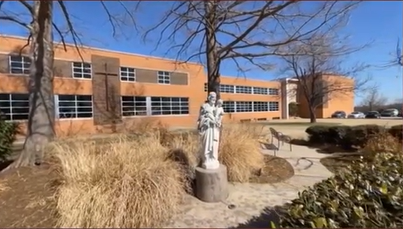
An Oklahoma board made history Monday by approving the nation’s first religious charter school, a move that could set the stage for a legal battle over whether such schools, which receive taxpayer money but are independently managed, are public or private.
In a 3-2 vote, the Statewide Virtual Charter School Board approved an application from the Archdiocese of Oklahoma City and the Diocese of Tulsa to open St. Isidore of Seville Catholic Virtual School of Seville, which would serve students across the state without access to a traditional Catholic school and expand course offerings for those who already attend Catholic schools.
Because the application said the charter school would be “Catholic in every way,” it sparked fierce controversy, with threats of lawsuits from opponents and supporters regardless of the decision. The board’s general counsel, Deputy Attorney General Niki Batt, reminded members before the vote that the state constitution and the charter school law included language requiring charter schools to be non-sectarian.
She said the courts would ultimately decide the issue and that the board’s role is to act in an “executive” capacity as opposed to one of advocacy.
“The heart of the matter comes down to whether these schools are public schools or private schools,” Batt said. “This is an issue making it up to the U.S. Supreme Court we speak. It’s not your job to make the law, and not your job to interpret the law. It is your job to enforce the law as it currently exists.”
Two of the three board members who voted for approval said they considered a no vote a violation of recent U.S. Supreme Court rulings banning religious discrimination in education. You can watch the board meeting here. (The proceedings begin at minute 1:33.)
Opponents argued before the board Monday that granting the application violated the separation of church and state. Supporters, including former Oklahoma GOP Chairman A.J. Ferate, an attorney who has worked on national religious freedom cases, said anything other than approval would run afoul of recent U.S. Supreme Court decisions that ban discrimination against faith-based in schools in state education choice programs.
“Over the past six years, there have been three very clear statements from the U.S. Supreme Court,” he said, citing Trinity Lutheran Church v. Comer, Espinoza v. Montana, and Carson v. Makin, which all upheld the positions of religious groups. “There is no reason that this board needs to enforce or consider any protections under that state provision.”
He added that he would be “happy to protect and defend” the board in a lawsuit from groups opposing their decision.
Since the state’s Catholic leadership filed the application, the issue has caused division, even among the state’s Republicans. Former Attorney General John O’Connor issued an opinion in December as his final official act that came as the statewide virtual charter school authorizing board was set to decide on the application.
O’Connor said in his opinion that the state’s ban on publicly funded charter schools operated by sectarian and religious groups could violate the U.S. Constitution’s First Amendment and should not be enforced.
His successor, Gentner Drummond, withdrew O’Connor’s opinion and argued that it was based on precedent for private schools. Drummond said that state law defines, and the attorney general has previously recognized, charter schools as public schools, and that allowing the state to sponsor a religious school would create “a slippery slope” to use religious liberty to justify state-sponsored religion.
The clash promoted Gov. Kevin Stitt to weigh in by releasing a letter disagreeing with Drummond’s withdrawal of his predecessor’s opinion. State Superintendent of Education Ryan Walters also supported the application.
On Monday, supporters praised the board’s decision.
“This is a win for religious liberty and education freedom in our great state, and I am encouraged by these efforts to give parents more options when it comes to their child’s education,” Stitt said in a statement.
“We are elated that the board agreed with our argument and application for the nation’s first religious charter school,” Brett Farley, the executive director of the Catholic Conference of Oklahoma, said after the decision. “Parents continue to demand more options for their kids, and we are committed to help provide them.”
Others, however, provided immediate pushback, including the nation’s leading charter school advocacy group.
“This decision runs afoul of state law and the U.S. Constitution. All charter schools are public schools, and as such must be non-sectarian,” Nina Rees, president and chief executive officer of the National Alliance for Public Charter Schools said in a statement shortly after the vote.
Rees continued that the application would undoubtedly face legal challenges from public school supporters.
“We stand ready to support charter school advocates on the ground in Oklahoma as they fight to preserve the public nature of these unique schools and protect the religious and civil rights of the students and teachers who choose them.”
The U.S. Supreme Court could decide the issue before any case involving St. Isidore of Seville reaches it. In a North Carolina dress code case, Peltier v. Charter Day School, the 4th U.S. Circuit Court of Appeals ruled that charter schools are state actors under the state’s legal framework and therefore bound by the Equal Protection Clause when it comes to setting and enforcing educational policies.
The high court asked Solicitor General Elizabeth B. Prelogar, the Biden administration’s top Supreme Court lawyer, for guidance.


